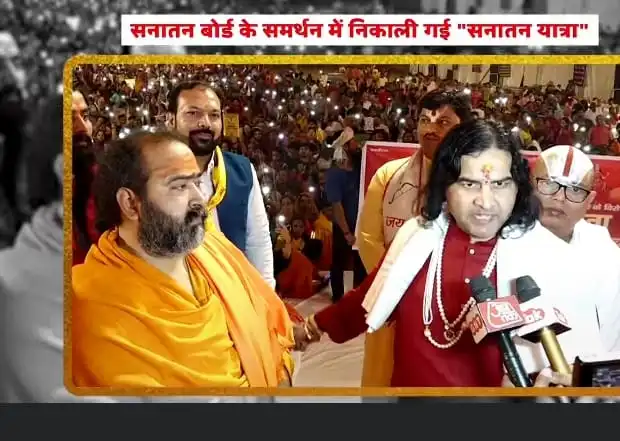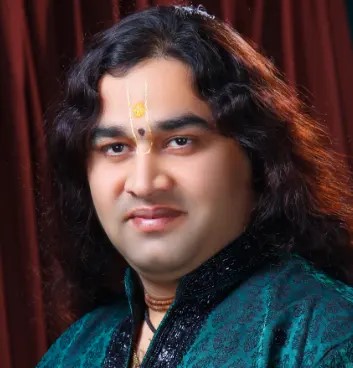In an era of rapid globalization and cultural shifts, the preservation of ancient spiritual traditions has become a pressing concern. Among these, Sanatan Dharma, often referred to as the eternal way of life, stands as a cornerstone of Indian culture and philosophy. A recent call to action by spiritual leader Devki Nandan Thakur Ji Maharaj to establish a Sanatan Board has sparked significant interest, both in India and abroad, among spiritual leaders, scholars, and the general public.
This article delves into the rationale behind the demand for the Sanatan Board, the vision of its proponents, the support it has received, and its potential implications for society.
The Vision for a Sanatan Board
Sanatan Dharma, with its deep-rooted emphasis on values such as dharma (righteousness), karma (action), and moksha (liberation), has guided countless generations. However, proponents of the Sanatan Board argue that the very essence of this tradition is under threat due to modernization, globalization, and growing misinformation about Hindu practices.
Devki Nandan Thakur Ji envisions the Sanatan Board as a unified institution to represent the interests of Hindus globally. The board would not only safeguard the teachings and practices of Sanatan Dharma but also serve as a voice to address contemporary challenges faced by the community.
The objectives of the proposed Sanatan Board include:
- Preservation of Cultural Heritage: Systematically documenting and promoting ancient texts, rituals, and traditions.
- Representation in Policy-Making: Ensuring that the community’s concerns are heard in decision-making processes related to culture and education.
- Legal and Financial Support: Offering aid to temples, priests, and religious organizations.
- Addressing Misinformation: Combating misrepresentation of Hindu traditions through educational initiatives.
- Engaging the Youth: Creating programs to make Sanatan Dharma relevant to younger generations and ensuring its continuity.
Constitutional and Legal Feasibility
India’s Constitution supports the formation of religious, cultural, and educational organizations under various provisions. Articles 25 and 26 provide individuals and communities the right to freely practice and propagate their religion and to establish and manage institutions for religious and charitable purposes.
‘Sanatan Board’ should be on the lines of ‘Waqf Board’
The ‘Sanatan Board’ could be established as a legally recognized entity under:
- The Societies Registration Act, 1860
- The Indian Trusts Act, 1882
- The Companies Act, 2013 (Section 8 for non-profit organizations)
Or alternatively, Central Government can create Sanatan Board for Hindus which operate transparently and aligns with constitutional principles. However, it must remain inclusive, non-political, and respectful of India’s secular ethos on the lines of the Waqf Act of 1995:
- The Waqf Act, 1995 (as amended in 2013) provides the legal basis for the creation and functioning of Waqf Boards in India.
- The Act mandates the establishment of State Waqf Boards for the management and administration of waqf properties.
- The Central Waqf Council, established under the Act, advises the government and State Waqf Boards on matters related to waqfs.
- The demand of Hindus is for establishment of Sanatan Board on the lines of Waqf Boards .

Prominent Supporters of the Sanatan Board
The demand for the Sanatan Board has found resonance among many spiritual leaders and scholars who share Thakur Ji’s concerns about the erosion of Sanatan Dharma. Several prominent figures have publicly expressed their support:
- Shankaracharya Swami Sadanand Saraswati: As a leading voice in the Sanatan Dharma Sansad held in Delhi on November 16, 2024, he emphasized the importance of the board in safeguarding Sanatan Dharma’s future.
- Dr. Ram Vilas Vedanti: A renowned Hindu saint, Dr. Vedanti advocated for the Sanatan Board and underscored its necessity to protect cultural heritage.
- Mahant Raju Das of Hanuman Garhi, Ayodhya: The Mahant highlighted the need for unity among followers of Sanatan Dharma and encouraged widespread organization to support the board’s establishment.
- Pandit Pradeep Mishra: A celebrated spiritual orator, Pandit Mishra extended his support to the initiative, emphasizing collective action to uphold the timeless values of Sanatan Dharma.
Challenges and Criticism
While the idea of a Sanatan Board has garnered significant support, it is not without challenges. Critics question its feasibility and potential implications in India’s pluralistic society. Concerns include:
- Secularism: Ensuring that the board does not breach India’s constitutional secular framework.
- Inclusivity: Avoiding alienation of other communities or sects within Hinduism.
- Political Neutrality: Preventing the board from being co-opted for political purposes.
Devki Nandan Thakur Ji and other proponents acknowledge these challenges but believe they can be addressed through dialogue, transparency, and a commitment to the principles of Sanatan Dharma.
Broader Implications
If realized, the Sanatan Board could have far-reaching implications:
- Cultural Revival: By promoting the values and teachings of Sanatan Dharma, the board could inspire a renewed sense of cultural identity among Hindus.
- Global Representation: A unified voice for Sanatan Dharma could counteract misinformation and foster better understanding of Hindu traditions globally.
- Youth Engagement: With targeted programs, the board could bridge the generational gap and make ancient teachings relevant to today’s youth.
The Road Ahead
The momentum behind the demand for a Sanatan Board reflects a larger awakening within the Hindu community. As spiritual leaders and scholars rally around this cause, the focus now shifts to translating this vision into reality. Collaborative efforts, legal compliance, and inclusivity will be key to ensuring the board’s success and long-term sustainability.
The call for a Sanatan Board, championed by Devki Nandan Thakur Ji Maharaj, represents a significant moment in the ongoing effort to preserve and promote Sanatan Dharma. With growing support from influential leaders and widespread enthusiasm from followers, the board has the potential to become a unifying force for Hindus globally.
While challenges remain, the vision of a unified body that safeguards spiritual traditions, engages the youth, and represents the community’s interests in policy-making has captured the imagination of millions. The journey to establish the Sanatan Board may be complex, but with dedication, dialogue, and transparency, it could serve as a beacon of cultural and spiritual revival for generations to come.







